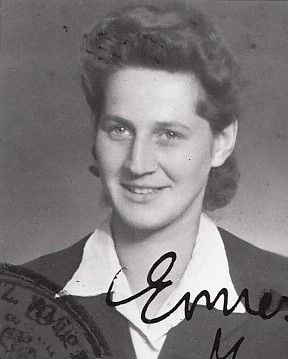Erna Musik, née Raus
17.04.1921 (Vienna) – 08.03.2009 (Vienna) Plain needle seamstress, self-employed entrepreneur, commercial councilor
Auschwitz-Birkenau: 15.04.1944 Ravensbrück: January 1945, Malchow until end of April 1945
Her dedication was recognized with numerous orders and certificates, including the Great Cross of Merit of the Republic of Austria and the “Silberne Kammermedaille”.

Erna Musik, Archiv DÖW, Wien
At the age of 16 years in the "Red Falcons" she met her future husband, Karl Musik. Together with him, she resisted the occupation of Austria by fascist Germany in a cell of revolutionary socialists.
An informer betrayed the group. Erna was arrested, her child was just three months old.
After several months in prison and interrogation in the Roßauer Lände police prison, she came to Auschwitz-Birkenau without a trial. She fell ill several times and could only stay on her feet on the transport to Ravensbrück with the support of her sister and friends. At that time there was not even space in the infamous tent in Ravensbrück. The new arrivals had to be encamped outdoors in the middle of winter. Kathe Sasso, who had been in Ravensbrück for a long time and also from Vienna, helped and provided Erna with clothing and food.
Erna was transported to Malchow, a subcamp of Ravensbrück, where she had to do forced labor in an ammunition factory. When the Soviet army approached, the prisoners were forced to "evacuate". After the guards slipped off, everyone was free.
Back home in Vienna, she found both her daughter and her husband.
Erna soon opened her own plain needle sewing shop. In 1947 she gave birth to a son, in 1957 to another daughter.
For a long time, the memories of the concentration camps tormented her so much that she didn't want to talk about them. In later years, however, she often spoke in schools as a witness to prevent possible new beginnings.
After the death of her husband in 1977, she took over the leadership of the SPÖ in Vienna-Brigittenau for the next 14 years. She was a district councilor for 17 years; the first woman in the business association and built up a women's organization there. She held various political positions, was chair of the freedom fighters in the district, honorary chair of the freedom fighters at the federal level and the state of Vienna. Her dedication was recognized with numerous orders and certificates, including the Great Cross of Merit of the Republic of Austria and the “Silberne Kammermedaille”. Erna has returned to Auschwitz every year since the late 1940s. She felt very attached to the Auschwitz camp community and actively organized and designed the memorial room for the Austrians in a former prisoners' barrack on the concentration camp site. She was a member of the Austrian Ravensbrück camp community and chaired it for several years. Seit Ende der 1940-er Jahre kehrte Erna jedes Jahr nach Auschwitz zurück. Sie fühlte sich der Lagergemeinschaft Auschwitz sehr verbunden und organisierte und gestaltete aktiv den Gedenkraum der Österreicher in einer ehemaligen Häftlingsbaracke auf dem KZ-Gelände mit. Sie war Mitglied der österreichischen Lagergemeinschaft Ravensbrück und einige Jahre ihre Vorsitzende.
Sources: Brigitte Halbmayr: „Ohne Organisieren hast du nicht leben können!“ - Erna Musik (geb. Raus) in: H. Amesberger / Brigitte Halbmayr (Hg) ; „Vom Leben und Überleben – Wege nach Ravensbrück. Das Frauenkonzentrationslager in der Erinnerung“, Band 2 - Lebensgeschichten, 2001, Promedia, Wien, S. 159-166, (ISBN 3-85371-176-6)